|
|
|
Sort Order |
|
|
|
Items / Page
|
|
|
|
|
|
|
| Srl | Item |
| 1 |
ID:
189466
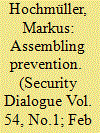

|
|
|
|
|
| Summary/Abstract |
This article examines the technopolitics of prevention in postwar Guatemala. In the 2010s, experts and policymakers shifted security governance in Central America’s most populous country towards anticipation. Against the background of rising gang violence, they implemented a set of sociopolitical and techno-material measures – based on the latest crime-control technologies, new policing strategies and urban design methods – in Guatemala’s most violent municipalities. The stated goals were to reconstruct state sovereignty and to improve public security by strengthening community resilience and inducing positive behavioural change in ‘at-risk’ citizens. Zooming in on the case of Villa Nueva, the article examines the emergence and effects of Guatemala’s ‘prevention assemblage’. It demonstrates that this technopolitical project has failed, as prevention turned into a new layer of control that shifted responsibility to local communities, further securitized urban spaces and populations, and reproduced exclusionary and repressive security governance.
|
|
|
|
|
|
|
|
|
|
|
|
|
|
|
|
| 2 |
ID:
189465
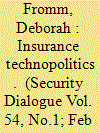

|
|
|
|
|
| Summary/Abstract |
In response to high levels of car theft, insurance companies in São Paulo have developed new systems and technologies for tracking and recovering stolen vehicles. These interventions are driven by an insurance rationality that seeks to manage risk and ensure these companies’ profitability. However, this article draws on the notion of technopolitics to argue that the tracking devices and other technologies mobilized in this way also exercise their own agency. They help to mediate and reorganize the power dynamics and relations between diverse actors who operate within São Paulo’s stolen car market and vehicle recovery processes, presenting both challenges and opportunities for each as they pursue their respective aims. The notion of ‘insurance technopolitics’ emphasizes this conjunction between risk governance and the contingent, technologically mediated relationships and conflicts to which it may give rise.
|
|
|
|
|
|
|
|
|
|
|
|
|
|
|
|
| 3 |
ID:
189464
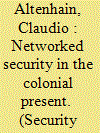

|
|
|
|
|
| Summary/Abstract |
The saturation of urban space with all kinds of information and communication technology–driven security devices has long since turned into a recurrent topic of both human geography and critical security studies. However, comparatively little effort has been made to analyze these technologies and infrastructures in relation to their locally specific modes of deployment. This relative failure to account for technopolitical path-dependencies may result in unilaterally positivistic descriptions, when, in fact, there is no such thing as a technopolitically and/or semantically ‘virgin’ urban fabric waiting to accommodate a new securitarian blueprint. The present article aims to address this lacuna by analyzing the introduction of a ‘smart’ surveillance system in São Paulo, Brazil. Taking as its point of departure the condomínio fechado (the ‘closed condominium’) as a locally specific urban diagram, it sets out to trace the system’s implementation along the lines of a (post)colonial topology sorting bodies and organizing circulations according to a historically entrenched pattern of social domination. Accordingly, despite its failure to significantly reduce crime rates and raise the general level of public security, the system succeeded in further normalizing a configuration in which the obsession with personal security eclipses any potential for political transformation. Its implementation thus endorses a social status quo that is both structurally violent and profoundly unequal.
|
|
|
|
|
|
|
|
|
|
|
|
|
|
|
|
| 4 |
ID:
189467
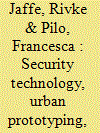

|
|
|
|
|
| Summary/Abstract |
In response to broader political and corporate tendencies towards ‘techno-solutionism’, critical studies of security technology highlight the threat that security technologies pose to civil rights and democratic accountability. This article argues for a slightly different perspective: rather than taking claims of technological efficacy at face value, it explores the multiple ways in which security-related technology so frequently fails to deliver its – confidently anticipated or feared – effects. A focus on sociotechnical failure can offer more comprehensive, on-the-ground understanding of the technopolitics of security. We suggest that these politics may lie precisely in the blurring of concepts of failure and success, as ‘prototyping’ and experimentation become an increasingly powerful logic of urban governance. This argument is developed through an analysis of security interventions in Jamaica, a context characterized by high levels of violent crime. The article focuses on three technologies that have been adapted to security-related purposes: a communication channel connecting police and private security guards, a public–private CCTV network, and a smart electricity grid. Drawing on approaches from science and technology studies, the article adopts a process-oriented approach, attending to both the discourses surrounding the introduction of these technologies and their everyday interactions with their social and built environments.
|
|
|
|
|
|
|
|
|
|
|
|
|
|
|
|
| 5 |
ID:
189463
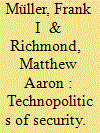

|
|
|
|
|
| Summary/Abstract |
This introduction to the special issue on ‘the technopolitics of security’ outlines key concepts and engages debates pertaining to the relationship between techno-materiality, security governance and struggles over sovereignty. ‘Technopolitics’ refers to the strategic practice of designing and using technologies to enact political goals, producing hybrid forms of power that combine cultural, institutional and technological dimensions. These technopolitical practices give rise to new forms of agency, producing effects unintended by their designers that may alter logics of political contestation and allow technologies to be reappropriated for different political purposes. To illustrate the distributed forms of agency and contingent encounters that the technopolitics approach evokes, the article develops three key aspects of technopolitics in its relationship to security governance: (1) an understanding of agency as distributed between human and non-human actors, but also asymmetric in that human intentionality plays an assembling role that is frequently overrun by the unintended effects; (2) the temporal horizons of imagination and action over which technopolitical interventions unfold, identifying the importance of logics of anticipation and eventization; and (3) the relationship between technopolitics and sovereignty, arguing that it encourages a decentred and materialized understanding of how claims to sovereignty are made and contested.
|
|
|
|
|
|
|
|
|
|
|
|
|
|
|
|
| 6 |
ID:
189468
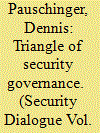

|
|
|
|
|
| Summary/Abstract |
This article reconsiders contemporary urban security governance. Conceptually, it revisits Foucault’s governmentality lectures to comprehend how security governance is carried out in places where the use of digital security technologies co-exists with overly lethal and repressive forms of policing. The author advances his analysis by conceptualizing a triangle of security governance in which disciplinary powers of control, apparatuses of security and sovereign/necropower are at work simultaneously, complemented by a fourth dimension that takes into account what Foucault outlined in the lectures as the ‘government of things’, which is the sociotechnical relationship between the agency of humans and machines. Empirically, the article explores the technopolitical turn in urban security policies in the city of Rio de Janeiro in the wake of the 2014 World Cup and the 2016 Olympics. Using discourses that are embedded in globalized mega-event security standards and legacy claims, authorities in Rio promoted a narrative of new material and non-material security measures that were intended both to secure the World Cup and the Olympics and to help overcome permanently entrenched urban conflicts in the city. By critically analysing these two approaches of new material and non-material security measures, the author shows how new security technologies are perfectly integrated into a continuum of death politics in Rio de Janeiro in ways that are conceptually best appreciated by considering how the triangle of security governance works in the digital era.
|
|
|
|
|
|
|
|
|
|
|
|
|
|
|
|
|
|
|
|
|